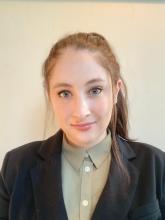Blazing trails by blending hard science with public health and social policy
Caroline Schuerger is serious about combining medical research and science advocacy to advance public health. After earning her undergraduate degree at University of North Carolina, Chapel Hill, she enrolled in the Cleveland Clinic Lerner College of Medicine (CCLCM), studying translational hematology and oncology research.
Schuerger’s Cleveland roots are deep: she was born at University Hospital; her father graduated from CWRU in engineering; and her grandfather, who is 96 and also graduated with an engineering degree from Case Institute of Technology, attended her White Coat ceremony in 2015.
A PhD candidate in molecular medicine at CCLCM, she extended her research for an extra year, participating in clinical rotations with her mentor and advisor, Yogen Saunthararajah, MD, to study the epigenetics of bladder cancer, the sixth most diagnosed cancer in the U.S. Her laboratory’s goal is to find non-toxic therapies that will help eliminate bladder cancer without hurting the patient.
Realizing that she also wanted to become involved in advocacy, Schuerger joined the Science and Human Rights Coalition (SHRC) of the American Association for the Advancement of Science. “The SHRC expands my reach beyond the lab bench, learning science policy and advocacy to advance public health," she said. "My overall goal is to combine my medical training with strategy, action and support to help my community through evidence-based science and data-driven policy."
Schuerger took time off from her lab in January through April, 2020, for a fellowship at the National Academy of Sciences in Washington D.C. Last September, she garnered a part-time internship with a congresswoman from California, spending her mornings virtually with legislators and afternoons in the lab. She also serves as president of CWRU’s Science and Human Rights Coalition.
To spark high school students’ interest in science, Schuerger and her colleagues held a reverse science fair at John Hay High School last year, where the students were the judges and the PhDs were the exhibitors. Recently, she visited Ohio State legislators in Columbus to discuss how a paid family medical leave program can improve STEM career retention in Ohio, and the need for a science policy fellowship program to improve the state’s capacity for evidence-based policy. And her op-ed on the importance of science advocacy was featured in Crain’s Cleveland Business last August.
“I'm very passionate about using science for the public good and most interested to apply my PhD training for policy,” Schuerger said. “The COVID-19 pandemic has made it very clear that there is a disconnect between government leaders and evidence-based experts in what is fundamentally policy implementation of a scientific issue.”


